英文翻译
英文句子翻译

1.Do you have a family?正确译文:你有孩子吗?2.It's a good father that knows his son。
就算是最好的父亲,也未必了解自己的儿子。
3.I have no opinion of that sort of man。
我对这类人很反感。
4.She put 5 dollars into my hand,"you have been a great man today."她把5美圆塞到我手上说:"你今天表现得很好."5.I was the youngest son, and the youngest but two。
我是最小的儿子,但是我还有两个妹妹。
6.The picture flattered her。
她比较上照。
7.The country not agreeing with her, she returned to England。
她杂那个国家水土不服,所以回到了英国。
8. He is a walking skeleton。
他很瘦。
9.The machine is in repair。
机器已经修好了。
10.He allowed the father to be overruled by the judge, and declared his own son guilty。
他让法官的职责战胜了父子的亲情,最终宣布儿子有罪。
11.You don't know what you are talking about。
你在胡说八道。
12.You don't begin to understand what they mean。
你根本不知道他们在干嘛.don't begin :决不13.They didn't praise him slightly。
他们大大地表扬了他。
14.That's all I want to hear。
万能英文翻译
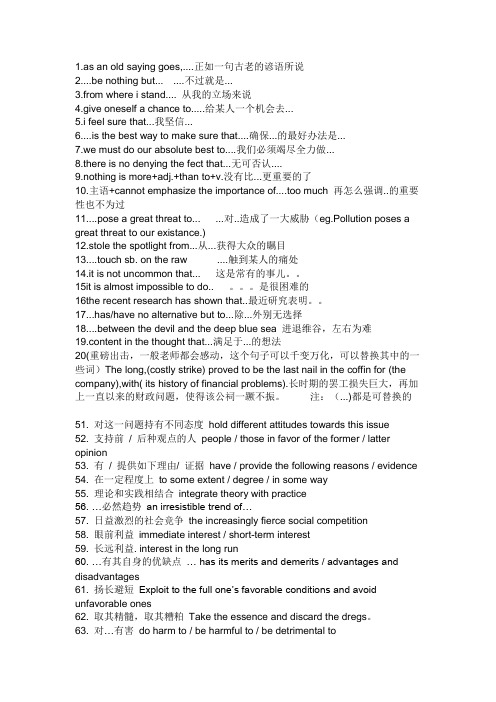
1.as an old saying goes,....正如一句古老的谚语所说2....be nothing but... ....不过就是...3.from where i stand.... 从我的立场来说4.give oneself a chance to.....给某人一个机会去...5.i feel sure that...我坚信...6....is the best way to make sure that....确保...的最好办法是...7.we must do our absolute best to....我们必须竭尽全力做...8.there is no denying the fect that...无可否认....9.nothing is more+adj.+than to+v.没有比...更重要的了10.主语+cannot emphasize the importance of....too much 再怎么强调..的重要性也不为过11....pose a great threat to... ...对..造成了一大威胁(eg.Pollution poses a great threat to our existance.)12.stole the spotlight from...从...获得大众的瞩目13....touch sb. on the raw ....触到某人的痛处14.it is not uncommon that... 这是常有的事儿。
15it is almost impossible to do.. 。
是很困难的16the recent research has shown that..最近研究表明。
17...has/have no alternative but to...除...外别无选择18....between the devil and the deep blue sea 进退维谷,左右为难19.content in the thought that...满足于...的想法20(重磅出击,一般老师都会感动,这个句子可以千变万化,可以替换其中的一些词)The long,(costly strike) proved to be the last nail in the coffin for (the company),with( its history of financial problems).长时期的罢工损失巨大,再加上一直以来的财政问题,使得该公祠一蹶不振。
汉译英语音在线翻译
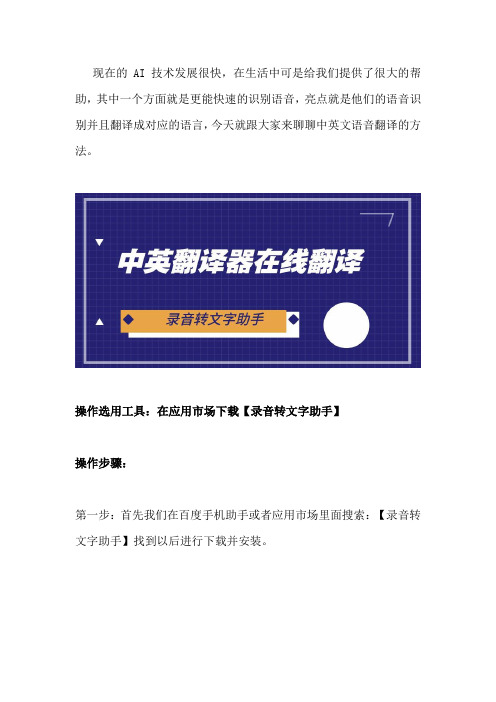
现在的AI技术发展很快,在生活中可是给我们提供了很大的帮助,其中一个方面就是更能快速的识别语音,亮点就是他们的语音识别并且翻译成对应的语言,今天就跟大家来聊聊中英文语音翻译的方法。
操作选用工具:在应用市场下载【录音转文字助手】
操作步骤:
第一步:首先我们在百度手机助手或者应用市场里面搜索:【录音转文字助手】找到以后进行下载并安装。
第二步:接着打开软件就可以看到【录音识别】、【文件识别】、【语音翻译】、【录音机】的四个功能,这里我们就举例说明下【语音翻译】。
第三步:点击橙色的【中文】按钮,开始说中文以后,下面就是翻译的英文。
第四步:点击蓝色的【English】按钮,开始说英文,就可以把你说的英语转成中文了。
以上就是语音翻译的操作步骤了,反正小编自己觉得用起来还是挺方便的,今天分享给大家,希望对大家有所帮助哦。
英语翻译中文
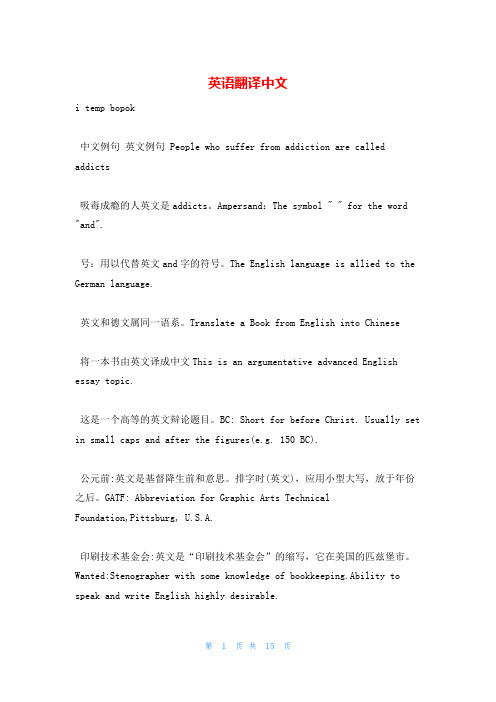
英语翻译中文i temp bopok中文例句英文例句 People who suffer from addiction are called addicts吸毒成瘾的人英文是addicts。
Ampersand:The symbol " " for the word "and".号:用以代替英文and字的符号。
The English language is allied to the German language.英文和德文属同一语系。
Translate a Book from English into Chinese将一本书由英文译成中文This is an argumentative advanced English essay topic.这是一个高等的英文辩论题目。
BC: Short for before Christ. Usually set in small caps and after the figures(e.g. 150 BC).公元前:英文是基督降生前和意思。
排字时(英文),应用小型大写,放于年份之后。
GATF: Abbreviation for Graphic Arts TechnicalFoundation,Pittsburg, U.S.A.印刷技术基金会:英文是“印刷技术基金会”的缩写,它在美国的匹兹堡市。
Wanted:Stenographer with some knowledge of bookkeeping.Ability to speak and write English highly desirable.聘速记员一名,要略懂簿记。
能说英语及写作英文,优先录取。
The most popular method to do that now is PCM. PCM stands for pulse code modulation.现在最常用的方法是PCM,这是英文脉冲编码调制的缩写。
中英文翻译的软件

中英文翻译的软件中英文翻译的软件是一种可以将中文文本翻译成英文或英文文本翻译成中文的工具。
这类软件可以提供方便快捷的翻译服务,帮助用户在跨语种交流中消除语言障碍。
下面将介绍几款常见的中英文翻译软件。
1. 谷歌翻译:谷歌翻译是目前最受欢迎的免费翻译软件之一。
它可以提供准确的中文到英文以及英文到中文的翻译,同时支持其他多种语言的翻译功能。
谷歌翻译利用了机器学习技术,可以根据大量的语料库数据进行翻译,并不断提高翻译质量。
2. 百度翻译:百度翻译是一款功能强大的翻译软件,可以提供精准的中英文互译服务。
它可以在输入框内输入需要翻译的文字,并快速翻译成英文或中文。
百度翻译还支持语音输入和录音翻译功能,让用户更方便地进行翻译。
3. 有道词典:有道词典是一款知名的在线翻译软件。
它具有快速、准确的翻译功能,可以将中文文本翻译成英文或将英文文本翻译成中文。
有道词典还拥有丰富的词库和例句,可以帮助用户更好地理解翻译结果。
4. 欧路词典:欧路词典是一款专业的英汉双向翻译软件。
它具有离线翻译功能,可以提供高质量的中英文翻译服务。
欧路词典还拥有丰富的词库和例句,可以帮助用户更全面地了解翻译结果。
5. 小牛翻译:小牛翻译是一款便捷易用的中英文翻译软件。
它支持文本翻译、扫描翻译和语音翻译三种模式,可以满足不同用户的需求。
小牛翻译还具有自动检测语言、智能换行和离线翻译等功能,提供更优质的翻译体验。
总结起来,中英文翻译的软件通过机器学习和大数据技术,能够提供快速准确的翻译服务。
用户可以根据自己的需求选择适合的翻译软件,帮助解决跨语种交流中的语言障碍。
常用的英文翻译

常用的英文翻译A AA制 Dutch treatment; to go DutchB 毕业答辩 thesis/dissertation defence 毕业设计 final project博士生 a PhD Candidate 报销 to apply for reimbursement博导 PhD student supervisor 班主任 class tutor必修/选修课 compulsory/optional courses/modules辩论队 debate team 辩论赛 debate contest 本命年 one's own Chinese zodiac yearC 成就感 sense of accomplishments/achievementsD 第三产业 the tertiary industry 导师 tutor, supervisor独立思考能力 capacity for independent thinking 党支部 Party branch党支部书记 Party branch secretary 调研 research; surveyE 厄尔尼诺现象 El Nino phenomenon 二等奖 the second prizeF 附中 affiliated (high or junior etc) school of ....附件(email): attachment 房地产 real estateG 公务员 civil servant (工作)单位 work unit工学学士/硕士 Bachelor/Master of Science (B.S & M.S)高考 National College Entrance Examination国家重点实验室 state key laboratory股份制 shareholding system; joint-stock system股份有限公司 Co. Ltd; company/corporation limited: limited corporationH 户口簿 residence booklet; household register; household registration booklet 获六级证书 obtain a certificate of CET-6J 甲方乙方 Part A and Party B 基础设施 infrastructure敬业精神 professional dedication; professional ethics讲师 lecturer 高级讲师 senior lecturer 技术支持 technical support精神文明建设 ideological and ethical progress机电一体化 Electromechanical Integration激烈的竞争 intense/fierce/bitter competition九五攻关 The 9th 5-year plan 竞争力 competitivenessK 可持续发展 sustainable development考研 take part in the entrance exams for postgraduate schools课代表 subject representativeL 理论联系实际 to link theory with practice论文答辩 thesis defence 劳动密集型labour-intensive联系方式 contacts;contact details; how to contact;M 民工 migrant workers/labourers 满分 full mark 面试 interviewP 平面设计 graphic designQ 全职full-timeR 人才 talent; talented people 理念 philosophy; value; doctrine入世 china's accession to the wto; china joins the wtoS 三个代表(论) the Three Represents (Theory) 三等奖 the third prize双刃剑double-edged sword 上网 to get on the internet适者生存 survival of the fittest 私营经济 private sector事业单位 public institution 私/民营企业 private enterprise三好学生 merit student; three good student(good in study, attitude and health)师兄无准确英译,可表达为'junior or senior (fellow) schoolmate/student双赢(局面) win-win; a win-win situation 实习 internship 实习生 intern双学位 double degree/dual degree 手机短信SMS/short message/instant message上市 to go public; to be listed (in the stock market)市场营销(活动) marketing (activitiess)硕博联读 a continuous academic project that involves postgraduate and doctoral study; a PhD programme水平一/二 English Proficiency Test I/II (of Tsinghua University)社会实践 social practice社会实践优秀个人 excellent individual in social practiceT 团队精神 esprit de corps OR team spirit 特此证明 this is to certify that.团支部书记 League branch secretary 团委 the Youth League committee特等奖学金 top class/level scholarship通过大学四级考试 pass the College English Test Band 4W 物业管理 asset management, property management物流 logistics外联部 liaison department (小的办公室,叫office)企业的外联部,通常是PR: Public Relations Division/DepartmentX 性价比 cost performance 学术交流 academic exchange信息化 adj and n. information v. informatise/informationisen. informatisation/informationisation 选修课 optional/selective courses/modules学位课 degree course 学号 student numberY 营销(学) marketing优胜互补 (the two parties...) have complementary advantages优胜劣汰,适者生存 survival of the fittest院士(见Z中科院条)与时俱进 to advance/progress with times 研究所 research institute以人为本 people oriented; people foremost研一生first-year graduate student一等奖学金 first class scholarship 一等奖 first prize有限公司 limited company; Ltd.Z振兴xxx: to rejuventate/revitalise xxx 准考证 admission ticket知识经济 knowledge economy; knowledge-based economy知识密集(性) knowledge-intensive知识产权 intellectual property rights中科院 the Chinese Academy of Sciences; Academia Sinica (院士 member, academician)中国工程院 the Chinese Academy of Engineering正版 adj. authorised综合国力 comprehensive national strength政治面貌 political status助教 teaching assistant (TA)自强不息,厚德载物 Self-discipline and Social Commitment 自我评价 self-assessment; self-evaluation。
最常用的一百句英语及翻译

77.I wonder if they can make it. 我在想他们是不是能办得到。
78.It’s not as cold / hot as it was yesterday. 今天不想昨天那么冷/热。
32.Can you believe that I bought a TV for $25?
33.Did you know he was having an affair/cheating on his wife? 你知道他有外遇了吗?/欺骗他的妻子吗?
34.Did you hear about the new project? 你知道那个新项目吗?
[ 最常用的一百句英语及翻译 ]
1.I’m an office worker. 我是上班族。
2.I work for the government. 我在政府机关做事。
3.I’m happy to meet you. 很高兴见到你。
4.I like your sense of humor. 我喜欢你的幽默感。
95.Thanks for taking me the movie. 谢谢你带我去看电影。
96.I am too tired to speak. 我累得说不出活来。
97.Would you tell me your phone number? 你能告诉我你的电话号码吗?
98.Where did you learn to speak English? 你从哪里学会说英语的呢?
92.I was wondering if you were doing anything this weekend. 我想知道这个周末你有什么要做。
英文翻译

1.Potluck Party:一种聚餐方式,主人准备场地和餐具,参加的人必须带一道菜或准备饮料,最好事先问问主人的意思。
2.Pull over!把车子开到旁边。
3.Drop me a line!写封信给我。
Give me a ring. = Call me!来个电话吧!4.For here or to go?堂食或外卖。
5.Cool:That's cool! 等於台湾年轻人常用的囗语"酷!",表示不赖嘛!用于人或事均可6.What's up? = What's happening? = What's new? 见面时随囗问候的话"最近在忙什么?有什么新鲜事吗?"一般的回答是"Nothing much!"或"Nothing new!"7.Cut it out! = Knock it out!= Stop it! 少来这一套!同学之间开玩笑的话。
8.Don't give me a hard time! 别跟我过不去好不好!9.Get yourself together! 振作点行不行!10.Do you have "the" time? 现在几点钟?可别误以为人家要约你出去。
11.Hang in there. = Don't give up. = Keep trying. 再撑一下。
12.Give me a break! 你饶了我吧!(开玩笑的话)13.Hang on. 请稍候。
14.Blow it. = Screw up. 搞砸了。
15.What a big hassle. 真是个麻烦事。
16.What a crummy day. 多倒霉的一天。
17.Go for it. 加油18.You bet. = Of course. 当然;看我的!19.Wishful thinking. 一厢情愿的想法。
必须收藏!!三种快速将英文翻译成中文的方法
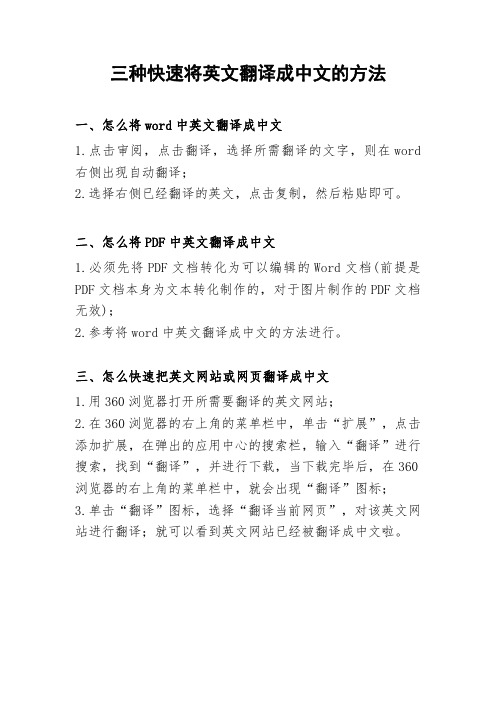
三种快速将英文翻译成中文的方法
一、怎么将word中英文翻译成中文
1.点击审阅,点击翻译,选择所需翻译的文字,则在word 右侧出现自动翻译;
2.选择右侧已经翻译的英文,点击复制,然后粘贴即可。
二、怎么将PDF中英文翻译成中文
1.必须先将PDF文档转化为可以编辑的Word文档(前提是PDF文档本身为文本转化制作的,对于图片制作的PDF文档无效);
2.参考将word中英文翻译成中文的方法进行。
三、怎么快速把英文网站或网页翻译成中文
1.用360浏览器打开所需要翻译的英文网站;
2.在360浏览器的右上角的菜单栏中,单击“扩展”,点击添加扩展,在弹出的应用中心的搜索栏,输入“翻译”进行搜索,找到“翻译”,并进行下载,当下载完毕后,在360浏览器的右上角的菜单栏中,就会出现“翻译”图标;
3.单击“翻译”图标,选择“翻译当前网页”,对该英文网站进行翻译;就可以看到英文网站已经被翻译成中文啦。
英语翻译:常用英语短语翻译
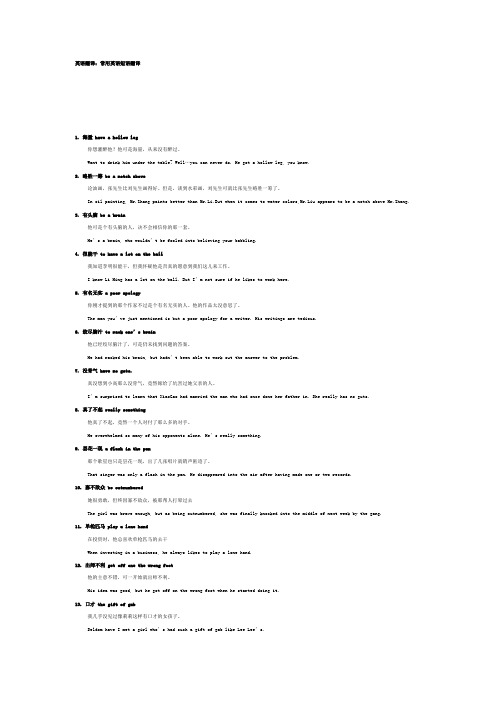
英语翻译:常用英语短语翻译1. 海量 have a hollow leg你想灌醉他?他可是海量,从来没有醉过。
Want to drink him under the table? Well…you can never do. He got a hollow leg, you know.2. 略胜一筹 be a notch above论油画,张先生比刘先生画得好。
但是,谈到水彩画,刘先生可就比张先生略胜一筹了。
In oil painting, Mr.Zhang paints better than Mr.Li.But when it comes to water colors,Mr.Liu appears to be a notch above Mr.Zhang.3. 有头脑 be a brain他可是个有头脑的人,决不会相信你的那一套。
He’s a brain, who wouldn’t be fooled into believing your babbling.4. 很能干 to have a lot on the ball我知道李明很能干,但我怀疑他是否真的愿意到我们这儿来工作。
I know Li Ming has a lot on the ball. But I’m not sure if he likes to work here.5. 有名无实 a poor apology你刚才提到的那个作家不过是个有名无实的人。
他的作品太没意思了。
The man you’ve just mentioned is but a poor apology for a writer. His writings are tedious.6. 绞尽脑汁 to rack one’s brain他已经绞尽脑汁了,可是仍未找到问题的答案。
He had racked his brain, but hadn’t been able to work out the answer to the problem.7. 没骨气 have no guts.真没想到小高那么没骨气,竟然嫁给了坑害过她父亲的人。
英文翻译

1. 这本书我已读了三遍。
正:I’ve read the book a third time.又如:He ate a second pear. 他又吃了一个梨。
2. 他在公共汽车后面追,并追上了。
正:He ran after the bus, and was able to catch it.3. 他接受过良好的教育。
正:He received a good education.4. 他做这事是偶然的,还是故意的? 正:Did he do it by accident or on purpose?5. 你怎么解释事故的原因? 正:How can you account for the accident?6. 不要杞人忧天。
正:Don’t cross th e bridge until you come to it. 正:Don’t walk across the bridge until you come to it.7. 你要想卖掉你的产品,你就得为此登广告。
正:If you want to sell your product you must advertise it.8. 他建议我同他们一起去。
正:He advised me to go with them.Y ou would be well advised to stay indoors. 你最好呆在家里。
9. 气候变化会影响你的健康。
正:The change in climate will affect your health.10. 这些方法适用于英语学习。
正:These methods apply to learning English.11. 如果你能告诉我一些情况,我将十分感激。
正:I’d appreciate it very much if you would tell me something about it.12. 他安排我去机场迎接客人。
英语翻译

The new office will cover the whole of Scotland.新的办事处业务遍及全苏格兰。
She’s covering the American election for BBC television.她在为英国广播公司的电视台报道美国大选。
I’m going to the doctor’s tomorrow so do you think you could cover my shift for me明天我要去看医生,你能替我代班吗Will £50 cover your expense50英镑够你花了吗Does your travel insurance cover you against the loss or theft of cash你的旅行保险金能补偿你的现金丢失或失窃吗We’ve got all the exits covered, so they’ve got no chance of escape.我们封锁了所有的出口,使他们插翅难逃。
He is an aggressive salesman.他是个很有进取心/干劲的销售员。
Aggressive photographers followed the princess everywhere and flooded the media with photos of her private life.无孔不入的摄影师们到处跟踪王妃,使得媒体上充斥着有关她私生活的照片。
Hitler carried out an aggressive policy after he seized power.希特勒摄取政权之后,推行了侵略政策。
3)Every life has its roses and thorns.这里把玫瑰和刺引申,译为:“每个人的生活有苦有甜。
5)He is in critical condition, see-sawing between life and death.See-saw原义是“跷跷板”,这里引申译为:他的病况危急,时好时坏,与死神搏斗。
英文高级翻译100句

1. Typical of the grassland dwellers of the continent is the American antelope, or pronghorn.美洲羚羊,或称叉角羚,是该大陆典型的草原动物。
2. Of the millions who saw Haley’s comet in 1986, how many people will live long enough to see it return in the twenty-first century?1986年看见哈雷慧星的千百万人当中,有多少人能够长寿到足以目睹它在二十一世纪的回归呢?3. Anthropologists have discovered that fear, happiness, sadness, and surprise are universally reflect ed in facial expressions.人类学家们已经发现,恐惧,快乐,悲伤和惊奇都会行之于色,这在全人类是共通的。
4. Because of its irritating effect on humans, the use of phenol as a general antiseptic has been largel y discontinued.由于苯酚对人体带有刺激性作用,它基本上已不再被当作常用的防腐剂了。
5. In group to remain in existence, a profit-making organization must, in the long run, produce some thing consumers consider useful or desirable.任何盈利组织若要生存,最终都必须生产出消费者可用或需要的产品。
6. The greater the population there is in a locality, the greater the need there is for water, transportation, and disposal of refuse.一个地方的人口越多,其对水,交通和垃圾处理的需求就会越大。
经典句子英文翻译
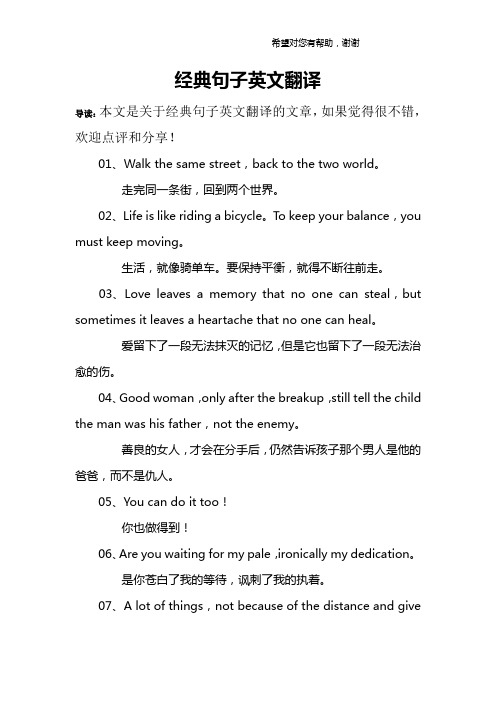
经典句子英文翻译导读:本文是关于经典句子英文翻译的文章,如果觉得很不错,欢迎点评和分享!01、Walk the same street,back to the two world。
走完同一条街,回到两个世界。
02、Life is like riding a bicycle。
To keep your balance,you must keep moving。
生活,就像骑单车。
要保持平衡,就得不断往前走。
03、Love leaves a memory that no one can steal,but sometimes it leaves a heartache that no one can heal。
爱留下了一段无法抹灭的记忆,但是它也留下了一段无法治愈的伤。
04、Good woman,only after the breakup,still tell the child the man was his father,not the enemy。
善良的女人,才会在分手后,仍然告诉孩子那个男人是他的爸爸,而不是仇人。
05、You can do it too!你也做得到!06、Are you waiting for my pale,ironically my dedication。
是你苍白了我的等待,讽刺了我的执着。
07、A lot of things,not because of the distance and giveup,just because of giving up and far away。
很多事情,不是因为遥远而放弃,只是因为放弃而遥远。
08、The world’s li ngering,the end is still no match for the forget the bitter oligonucleotide soup。
几世的缠绵,终还是敌不过那苦涩寡汤的忘却。
09、Never too old to learn。
常用的英文缩写翻译
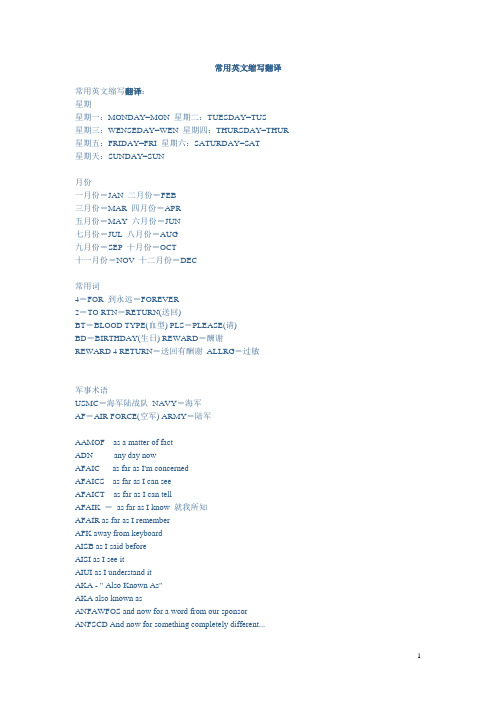
常用英文缩写翻译常用英文缩写翻译:星期星期一:MONDAY=MON 星期二:TUESDAY=TUS星期三:WENSEDAY=WEN 星期四:THURSDAY=THUR 星期五:FRIDAY=FRI 星期六:SATURDAY=SAT星期天:SUNDAY=SUN月份一月份=JAN 二月份=FEB三月份=MAR 四月份=APR五月份=MAY 六月份=JUN七月份=JUL 八月份=AUG九月份=SEP 十月份=OCT十一月份=NOV 十二月份=DEC常用词4=FOR 到永远=FOREVER2=TO RTN=RETURN(送回)BT=BLOOD TYPE(血型) PLS=PLEASE(请)BD=BIRTHDAY(生日) REWARD=酬谢REWARD 4 RETURN=送回有酬谢ALLRG=过敏军事术语USMC=海军陆战队NAVY=海军AF=AIR FORCE(空军) ARMY=陆军AAMOF as a matter of factADN any day nowAFAIC as far as I'm concernedAFAICS as far as I can seeAFAICT as far as I can tellAFAIK =as far as I know 就我所知AFAIR as far as I rememberAFK away from keyboardAISB as I said beforeAISI as I see itAIUI as I understand itAKA - " Also Known As"AKA also known asANFAWFOS and now for a word from our sponsor ANFSCD And now for something completely different...ARP - " Address Resolution Protocol"ARQ - " Automatic Repeat Request"ASAP as soon as possibleASCII(American Standard Code for Information Interchange) :美国信息交换标准码。
英文句子翻译

1.Do you have a family?正确译文:你有孩子吗?2.It's a good father that knows his son。
就算是最好的父亲,也未必了解自己的儿子。
3.I have no opinion of that sort of man。
我对这类人很反感。
4.She put 5 dollars into my hand,"you have been a great man today."她把5美圆塞到我手上说:"你今天表现得很好."5.I was the youngest son, and the youngest but two。
我是最小的儿子,但是我还有两个妹妹。
6.The picture flattered her。
她比较上照。
7.The country not agreeing with her, she returned to England。
她杂那个国家水土不服,所以回到了英国。
8. He is a walking skeleton。
他很瘦。
9.The machine is in repair。
机器已经修好了。
10.He allowed the father to be overruled by the judge, and declared his own son guilty。
他让法官的职责战胜了父子的亲情,最终宣布儿子有罪。
11.You don't know what you are talking about。
你在胡说八道。
12.You don't begin to understand what they mean。
你根本不知道他们在干嘛. don't begin :决不13.They didn't praise him slightly。
他们大大地表扬了他。
14.That's all I want to hear。
英文译中文在线翻译
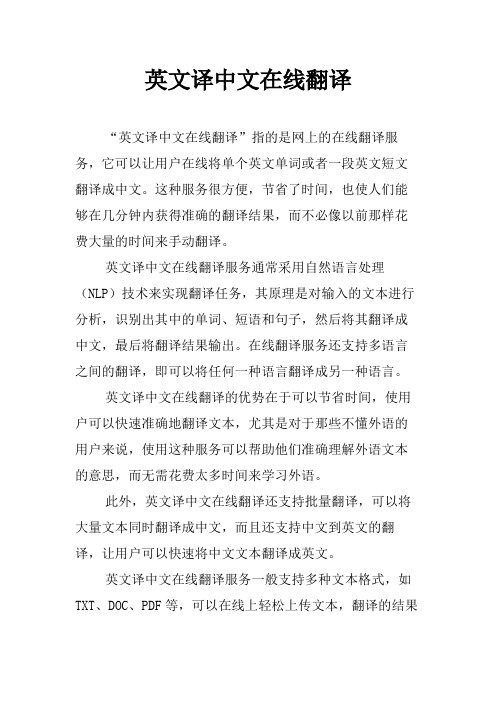
英文译中文在线翻译
“英文译中文在线翻译”指的是网上的在线翻译服务,它可以让用户在线将单个英文单词或者一段英文短文翻译成中文。
这种服务很方便,节省了时间,也使人们能够在几分钟内获得准确的翻译结果,而不必像以前那样花费大量的时间来手动翻译。
英文译中文在线翻译服务通常采用自然语言处理(NLP)技术来实现翻译任务,其原理是对输入的文本进行分析,识别出其中的单词、短语和句子,然后将其翻译成中文,最后将翻译结果输出。
在线翻译服务还支持多语言之间的翻译,即可以将任何一种语言翻译成另一种语言。
英文译中文在线翻译的优势在于可以节省时间,使用户可以快速准确地翻译文本,尤其是对于那些不懂外语的用户来说,使用这种服务可以帮助他们准确理解外语文本的意思,而无需花费太多时间来学习外语。
此外,英文译中文在线翻译还支持批量翻译,可以将大量文本同时翻译成中文,而且还支持中文到英文的翻译,让用户可以快速将中文文本翻译成英文。
英文译中文在线翻译服务一般支持多种文本格式,如TXT、DOC、PDF等,可以在线上轻松上传文本,翻译的结果
也可以直接下载到本地,使用户可以快速方便地获取翻译结果。
另外,英文译中文在线翻译服务还支持实时翻译,可以让用户及时获得翻译结果,这对于那些需要快速翻译文本的用户来说特别有用。
总之,英文译中文在线翻译的出现为人们翻译文本带来了极大的便利,节省了大量的时间,使用户可以快速准确地翻译文本,而无需担心翻译结果的准确性。
英文字母翻译

英文字母翻译
英文字母是指英语字母表中的26个字母,它们是英语书写和拼音的基础。
下面是英文字母的翻译。
A - 阿
B - 比
C - 西
D - 迪
E - 伊
F - 艾弗
G - 吉
H - 艾尺
I - 艾
J - 杰
K - 开
L - 艾勒
M - 艾马
N - 艾娜
O - 奥
P - 皮
Q - 奎
R - 艾儿
S - 艾丝
T - 提
U - 伊吾
V - 维
W - 豆贝尔维
X - 艾克斯
Y - wye
Z - 贼德
这些翻译是根据拼音来确定的,每个字母的翻译都是根据其在英语中的发音来确定的。
对于一些特殊的字母,如Q、W、X、Y,它们的翻译可能不太容易找到与之相对应的汉字,所以就
直译了。
这些翻译在中文中多用于对英语字母进行读拼音时的辅助工具。
在学习英语、教育、科技、商业等领域中,英文字母的使用非常广泛,熟练掌握英文字母的拼写和发音对于学习和交流都是非常重要的。
中英翻译器在线翻译

咱遇到不懂的英文就想知道它的中文什么意思,外国人遇到不懂的中文就想知道英文什么意思,那怎么怎么做到中英文自如的转换呢。
操作选用工具:在应用市场下载【录音转文字助手】
操作步骤:
第一步:首先我们在百度手机助手或者应用市场里面搜索:【录音转
文字助手】找到以后进行下载并安装。
第二步:接着打开软件就可以看到【录音识别】、【文件识别】、【语音翻译】、【录音机】的四个功能,这里我们就举例说明下【语音翻译】。
第三步:点击橙色的【中文】按钮,开始说中文以后,下面就是翻译的英文。
第四步:点击蓝色的【English】按钮,开始说英文,就可以把你说的英语转成中文了。
手机语音翻译转换为文字的方法到此结束,有需要或者感兴趣的可以去试试。
- 1、下载文档前请自行甄别文档内容的完整性,平台不提供额外的编辑、内容补充、找答案等附加服务。
- 2、"仅部分预览"的文档,不可在线预览部分如存在完整性等问题,可反馈申请退款(可完整预览的文档不适用该条件!)。
- 3、如文档侵犯您的权益,请联系客服反馈,我们会尽快为您处理(人工客服工作时间:9:00-18:30)。
河南科技学院新科学院2012届本科毕业生论文(设计)英文文献及翻译Why China Struggles with Food Safety学生姓名:杨金微所在院系:经济与管理系所学专业:国际经济与贸易导师姓名:董家强(讲师)完成时间:2012年3月20日Why China Struggles with Food SafetyLaurie Burkitt(美国《华尔街日报》作者)Ink, dye, bleach, wax and toxic chemicals: These are just a few of the substances that have been found recently in food products in China, reigniting fears over food safety despite repeated government pledges to crack down on tainted eats.Why is China having such trouble making its food safe?Chinese lawmakers passed new food-safety legislation meant to tighten supervision of manufacturers and impose tougher penalties on those who make bad products as the government seeks to restore public confidence after a spate of problems with tainted food.The new law, approved by the standing committee of the National People's Congress on Saturday after years of drafting and revision, also sets up a system to recall problem products and authorizes the enforcement of uniform nationwide standards for everything from allowable additives to nutritional labeling.United Nations public-health experts last year called for an overhaul of China's food-safety system, saying that the country's 'disjointed' approach and reliance on a patchwork of various local and national government agencies to police the food supply had contributed to troubles such as the melamine adulteration.The law passed Saturday aims to streamline regulation, in part by creating a national food-safety commission to coordinate work by other government agencies, and by reducing the number of agencies involved. But responsibility for developing standards and enforcing them will remain split among various ministries.Food safety consistently ranks among the top concerns of Chinese citizens in opinion polls. The government is eager to be seen as protecting the food supply, in the face of regular and well-publicized problems. Late last month, for instance, pig organs contaminated with a banned steroid sickened dozens of people in the southern city of GuangzhouWhile China is no stranger to food scandals, a spate of food contamination cases brought to light over the past month has been shocking even to the most jaded of observers here. Over the past few days, health authorities in the southern province of Guangdong shut down 17 noodle makers after they were discovered mixing ink and wax to their dough. Meanwhile, over the weekend, nearly 300 people in the city of1Changsha were reportedly sickened after eating meat contaminated with the banned 'skinny meat' additive clenbuterol, the subject of a meat industry crackdown in March. In perhaps the most bizarre case, also in Changsha, a number of consumers earlier this month walked into their kitchens at night to discover their store-bought pork was glowing in the dark.U.S. food and drug regulators are requesting Beijing's help in implementing a new food-safety law requiring stricter oversight of exported food, a sign of China's growing importance as a food exporter for Americans.U.S. Food and Drug Administration officials are seeking increased data sharing with China and other big trading partners to identify and prevent high-risk problems in food trade, said Dara Corrigan, associate commissioner for regulatory affairs of the FDA, at a news briefing . 'Transparency on both sides is critical,' she said.The move comes as the U.S. looks to implement the Food Safety Modernization Act, a law passed in January requiring food importers to verify the safety of their food from suppliers. Regulators said the law is aimed at preventing food contamination rather than responding to it. It relies heavily on the cooperation of other countries. The U.S. runs a fat trade surplus with China in agricultural products due in part to China's appetite for American soybeans, but China is increasingly providing food for U.S. dinner tables. Major exports include processed vegetables and fruit juices.U.S. officials at the beginning of this year have sought China's suggestions on how to implement the law's requirements.China has been strengthening oversight of food over the past few years, but food safety remains a big issue, even three years after milk contaminated with the chemical melamine caused the deaths of at least six children and illnesses in 300,000 others. China currently lacks enforcement of its food-safety laws and has an insufficient number of inspectors, said Li Tairan, a director of food safety at the Ministry of Health, at a food-safety conference.Beijing has struggled with food safety for years. The problem appeared to come to a head in 2008, when milk tainted with the industrial chemical melamine killed at least six children, sickened tens of thousands of others in 2008 and appeared to shock the government into taking decisive action. But the melamine eventually reappeared in the Chinese food supply, along with a host of other chemicals and illegal additives, leading many observers to wonder why China can't seem to solve such a fundamental problem.2One of the biggest issues is the drive to make a buck at any cost, says Lester Ross, a Beijing-based attorney with U.S. law firm WilmerHale. Some companies see that by using additives, they can cut overhead costs or boost profit margins, and they merely aren't thinking about the affects the additives will have on consumers, Mr. Ross says. The answer to that, according to Mr. Ross, is an education blitz. China has the ability to plaster its subways, bus stations and even television screens with messages and advertising that lets all people know the dangers involved using chemical additives in food.Local media reports of illnesses related to chemical consumption have helped, Mr. Ross says. A flood of news stories in recent days have informed Chinese consumers that meat containing clenbuterol may be leaner, but it may also cause headaches, nausea, and heart palpitations, while vegetables with sodium nitrite may grow faster, but they can also cause cancer.In a push for greater clarity, China's Ministry of Health is planning to revise and make public its list of legal food additives by the end of the year, while also publishing a black list of illegal additives, the state run China Daily reports.But education is only part of the problem. Another issue, according to Mr. Ross, is that there are too many cooks in the kitchen -- or rather too many bureaucracies handling food safety. The Ministry of Health is the lead agency on food safety issues, he explains, but the State Administration for Industry and Commerce is also involved, as are the State Food and Drug Administration and the Ministry of Agriculture. Struggles with food safety are not a specifically Chinese problem. Many countries, including the U.S. and Japan, have gone through similar growing pains in the food industry, says Wu Ming, a professor at Beijing University's school of public health. Sanitation and contamination issues permeated the food manufacturing and processing U.S. in the late-19th century. As China law scholar Stanley Lubman recently noted, it wasn't until 1906, when Upton Sinclair published 'The Jungle,' a book that unveiled the horrific standards of meat-packing plants of Chicago, that the U.S. began to wake up to its food safety problems.The big difference between the U.S. and China is size, Ms. Ming says, adding that the quantity of companies involved in China's food industry will make for tougher regulatory obstacles.'It's impossible to lessen such problems overnight,' Mrs. Ming said. 'It will take many years.'3中国人吃上安全食品为何这么难Laurie Burkitt(美国《华尔街日报》作者)墨汁、染料、漂白、石蜡和有毒化学物质:这些只是其中几样最近在中国食品中发现的物质。
